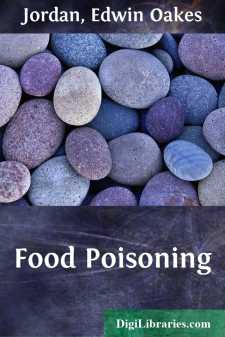Categories
- Antiques & Collectibles 13
- Architecture 36
- Art 48
- Bibles 22
- Biography & Autobiography 813
- Body, Mind & Spirit 142
- Business & Economics 28
- Children's Books 16
- Children's Fiction 13
- Computers 4
- Cooking 94
- Crafts & Hobbies 4
- Drama 346
- Education 46
- Family & Relationships 57
- Fiction 11829
- Games 19
- Gardening 17
- Health & Fitness 34
- History 1377
- House & Home 1
- Humor 147
- Juvenile Fiction 1873
- Juvenile Nonfiction 202
- Language Arts & Disciplines 88
- Law 16
- Literary Collections 686
- Literary Criticism 179
- Mathematics 13
- Medical 41
- Music 40
- Nature 179
- Non-Classifiable 1768
- Performing Arts 7
- Periodicals 1453
- Philosophy 64
- Photography 2
- Poetry 896
- Political Science 203
- Psychology 42
- Reference 154
- Religion 513
- Science 126
- Self-Help 84
- Social Science 81
- Sports & Recreation 34
- Study Aids 3
- Technology & Engineering 59
- Transportation 23
- Travel 463
- True Crime 29
Food Poisoning
Description:
Excerpt
INTRODUCTION
How frequently food poisoning occurs is not definitely known. Everybody is aware that certain articles of food are now and again held responsible for more or less severe "attacks of indigestion" or other physiological disturbances that have followed their consumption, but in many cases the evidence for assuming a causal connection is of the slightest. That convenient refuge from etiological uncertainty, "ptomain poisoning," is a diagnosis that unquestionably has been made to cover a great variety of diverse conditions, from appendicitis and the pain caused by gallstones to the simple abdominal distention resulting from reckless gorging.
No doubt can be entertained, however, that intestinal and other disorders due to particular articles of food occur much more frequently than they are recorded. There are few persons who have not experienced gastro-intestinal attacks of moderate severity which could be reasonably attributed to something eaten shortly before. It is often possible to specify with a fair degree of certainty the offending food. The great majority of such attacks are of a mild character, are quickly recovered from, and are never heard of beyond the immediate family circle. Only when the attack is more serious than the average or when a large number of persons are affected simultaneously does knowledge of the occurrence become more widely spread. A small proportion of food-poisoning cases receives notice in the public press and a still smaller proportion is reported in the medical journals. Very few indeed are ever completely investigated as to their origin.
Although most attacks of food poisoning are usually of a slight and apparently temporary nature, it does not follow that they are to be considered negligible or of trivial importance from the standpoint of public health. The human organism is always more or less weakened by such attacks, many of them, as we shall see, genuine infections; and, as is known to be the case with many infectious diseases, some permanent injurious impression may be left on the body of the affected individual. Under certain conditions it is possible that degenerative changes are initiated or accelerated in the kidneys or blood vessels by the acute poisoning which is manifested for a short time in even the milder cases. In yet greater degree these changes may follow those insidious forms of food poisoning due to the frequent ingestion of small quantities of mineral or organic poisons, which in each dose may cause little or no measurable physiological change, but whose cumulative effect may be vicious. In view of the grave situation evidenced by the increase in the degenerative diseases affecting early middle life in the United States, the extent, causes, and means of prevention of food poisoning seem pressing subjects for investigation.
THE EXTENT OF FOOD POISONING
Since cases of food poisoning, "ptomain poisoning," and the like are not required by law to be reported, public health authorities in general possess no information respecting their occurrence....


